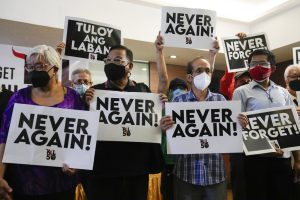Human rights activists on Thursday launched a new campaign in the Philippines to prevent a repeat of the abuses and plunder of the martial-law era that began 50 years ago under the father of the country’s new president, Ferdinand Marcos Jr.
Pro-Marcos propaganda has portrayed the late president’s reign as a “golden era.” But the activists said in a news conference they would fight efforts by Marcos Jr. and his supporters to gloss over the widespread human rights atrocities and corruption committed under the elder Marcos’ dictatorship.
He imposed martial law in the Philippines in September 1972 and finally was ousted in a 1986 army-backed “People Power” pro-democracy uprising.
His family returned home from U.S. exile in 1991 and accomplished an astonishing political comeback that culminated with the landslide victory of his son in the May presidential race. Marcos Jr. took office on June 30.
He has steadfastly refused to acknowledge and apologize for the abuses under his father’s rule. There was no immediate comment from Marcos Jr. or his key advisers after Thursday’s news conference.
“The reign of the Marcoses was never a golden era,” the activists said in a joint statement. “Unmasking what it really was and underscoring its bitter lessons is urgent and extremely necessary because of the continuing disinformation and organized distortion of history with the government’s official imprimatur.”
Film director Joel Lamangan, who was jailed and tortured during the martial law era, cited an upcoming movie being promoted by Sen. Imee Marcos, the president’s elder sister, which depicts their family’s version of the dramatic 72 hours before they were driven from the presidential palace in Manila to U.S. exile.
Sen. Imee Marcos has told reporters she felt the need to tell her family’s side of the story, but Lamangan said he expected the movie to be a dramatic “cover-up.”
Judy Taguiwalo, a retired university professor who was jailed and severely tortured during the Marcos dictatorship, said the fight for justice and freedom is generational. She asked the young to take over the struggle from activists like her who are now mostly in their 70s and 80s.
“The young should really come forward because we’re afflicted by rheumatism and we have many co-morbidities,” said Taguiwalo, now 72. “Never again, never forget, continue the fight.”
The campaign organizers said they planned events to explain how the martial-law era’s abuses were whitewashed to bring another Marcos back to the presidency.
Human rights lawyer Edre Olalia said Filipinos should closely examine Marcos Jr.’s track record, including his past tax conviction, the non-payment of a huge estate tax by the Marcos family, and his silence on the rights abuses and plunder under his father’s strongman rule.
“We have the benefit of a hindsight,” Olalia said. “There is material basis and reasonable ground to be skeptical.”
The elder Marcos died in exile in Hawaii in 1989 without admitting any wrongdoing, including accusations that he and his family amassed an estimated $5 billion to $10 billion while he was in power.
But a Hawaii court later found him liable for massive human rights violations and awarded $2 billion from his estate to compensate more than 9,000 Filipinos who filed a lawsuit against him for torture, incarceration, extrajudicial killings, and disappearances.

































